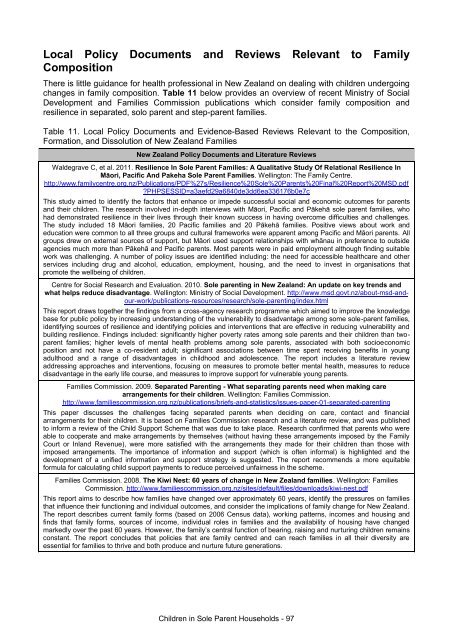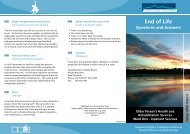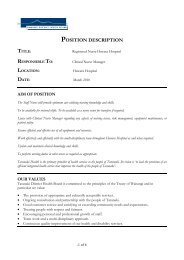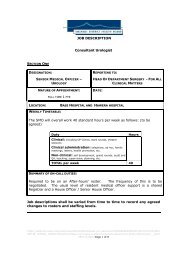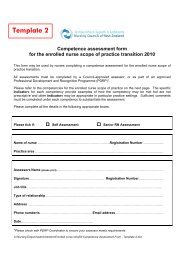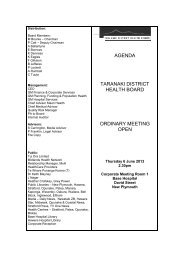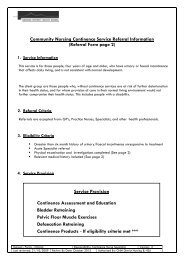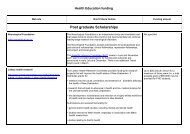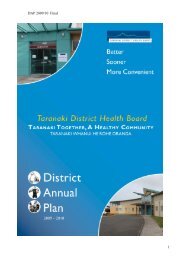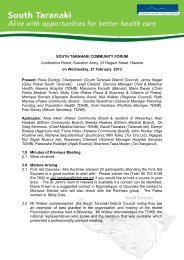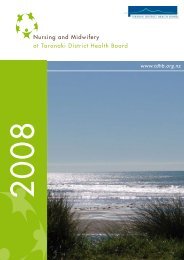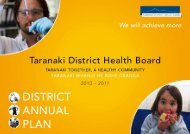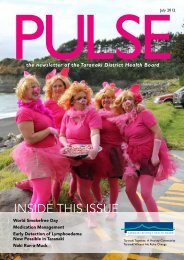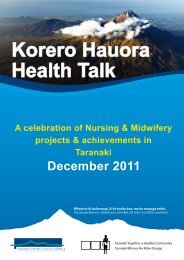This annual report - Taranaki District Health Board
This annual report - Taranaki District Health Board
This annual report - Taranaki District Health Board
- No tags were found...
You also want an ePaper? Increase the reach of your titles
YUMPU automatically turns print PDFs into web optimized ePapers that Google loves.
Local Policy Documents and Reviews Relevant to FamilyCompositionThere is little guidance for health professional in New Zealand on dealing with children undergoingchanges in family composition. Table 11 below provides an overview of recent Ministry of SocialDevelopment and Families Commission publications which consider family composition andresilience in separated, solo parent and step-parent families.Table 11. Local Policy Documents and Evidence-Based Reviews Relevant to the Composition,Formation, and Dissolution of New Zealand FamiliesNew Zealand Policy Documents and Literature ReviewsWaldegrave C, et al. 2011. Resilience In Sole Parent Families: A Qualitative Study Of Relational Resilience InMāori, Pacific And Pakeha Sole Parent Families. Wellington: The Family Centre.http://www.familycentre.org.nz/Publications/PDF%27s/Resilience%20Sole%20Parents%20Final%20Report%20MSD.pdf?PHPSESSID=a3aefd29a6840de3dd6ea336176b0e7c<strong>This</strong> study aimed to identify the factors that enhance or impede successful social and economic outcomes for parentsand their children. The research involved in-depth interviews with Māori, Pacific and Pākehā sole parent families, whohad demonstrated resilience in their lives through their known success in having overcome difficulties and challenges.The study included 18 Māori families, 20 Pacific families and 20 Pākehā families. Positive views about work andeducation were common to all three groups and cultural frameworks were apparent among Pacific and Māori parents. Allgroups drew on external sources of support, but Māori used support relationships with whānau in preference to outsideagencies much more than Pākehā and Pacific parents. Most parents were in paid employment although finding suitablework was challenging. A number of policy issues are identified including: the need for accessible healthcare and otherservices including drug and alcohol, education, employment, housing, and the need to invest in organisations thatpromote the wellbeing of children.Centre for Social Research and Evaluation. 2010. Sole parenting in New Zealand: An update on key trends andwhat helps reduce disadvantage. Wellington: Ministry of Social Development. http://www.msd.govt.nz/about-msd-andour-work/publications-resources/research/sole-parenting/index.html<strong>This</strong> <strong>report</strong> draws together the findings from a cross-agency research programme which aimed to improve the knowledgebase for public policy by increasing understanding of the vulnerability to disadvantage among some sole-parent families,identifying sources of resilience and identifying policies and interventions that are effective in reducing vulnerability andbuilding resilience. Findings included: significantly higher poverty rates among sole parents and their children than twoparentfamilies; higher levels of mental health problems among sole parents, associated with both socioeconomicposition and not have a co-resident adult; significant associations between time spent receiving benefits in youngadulthood and a range of disadvantages in childhood and adolescence. The <strong>report</strong> includes a literature reviewaddressing approaches and interventions, focusing on measures to promote better mental health, measures to reducedisadvantage in the early life course, and measures to improve support for vulnerable young parents.Families Commission. 2009. Separated Parenting - What separating parents need when making carearrangements for their children. Wellington: Families Commission.http://www.familiescommission.org.nz/publications/briefs-and-statistics/issues-paper-01-separated-parenting<strong>This</strong> paper discusses the challenges facing separated parents when deciding on care, contact and financialarrangements for their children. It is based on Families Commission research and a literature review, and was publishedto inform a review of the Child Support Scheme that was due to take place. Research confirmed that parents who wereable to cooperate and make arrangements by themselves (without having these arrangements imposed by the FamilyCourt or Inland Revenue), were more satisfied with the arrangements they made for their children than those withimposed arrangements. The importance of information and support (which is often informal) is highlighted and thedevelopment of a unified information and support strategy is suggested. The <strong>report</strong> recommends a more equitableformula for calculating child support payments to reduce perceived unfairness in the scheme.Families Commission. 2008. The Kiwi Nest: 60 years of change in New Zealand families. Wellington: FamiliesCommission. http://www.familiescommission.org.nz/sites/default/files/downloads/kiwi-nest.pdf<strong>This</strong> <strong>report</strong> aims to describe how families have changed over approximately 60 years, identify the pressures on familiesthat influence their functioning and individual outcomes, and consider the implications of family change for New Zealand.The <strong>report</strong> describes current family forms (based on 2006 Census data), working patterns, incomes and housing andfinds that family forms, sources of income, individual roles in families and the availability of housing have changedmarkedly over the past 60 years. However, the family’s central function of bearing, raising and nurturing children remainsconstant. The <strong>report</strong> concludes that policies that are family centred and can reach families in all their diversity areessential for families to thrive and both produce and nurture future generations.Children in Sole Parent Households - 97


